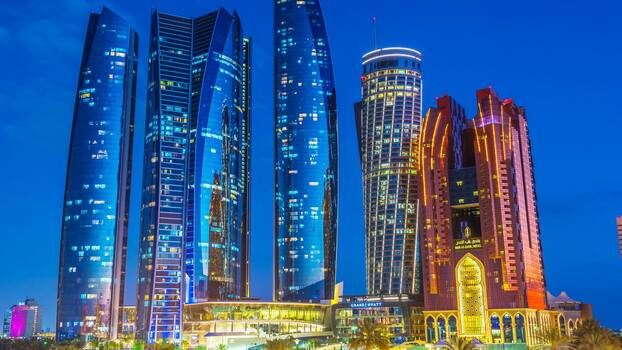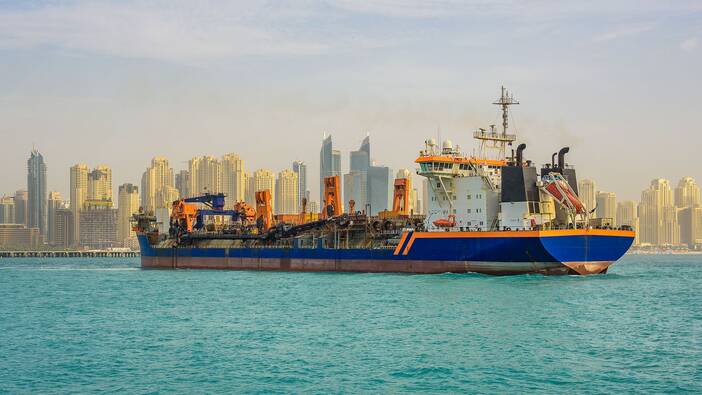
How does the use of certain resources influence a society’s political structure? Are there energy systems that are inherently more democratic or others that lead to dictatorships?
Juliane Schumacher is a Berlin-based researcher, freelance journalist, and author.
This question has been asked and discussed in various forms by many social and academic movements. The anti-nuclear movement of the 1980s argued that a centralized energy supply involving nuclear power plants would lead to a corresponding centralization of political power by the state. Generations of proponents of renewable energy have advocated for the latter because they hoped it would facilitate or promote grassroots democracy.
This question was and remains particularly relevant when it comes to oil, and especially with regard to oil in the Arab world. As a resource, oil has been so influential for the development of the region in the twentieth century and beyond that a focus on the countries of the Arab world means a focus on oil.
For a long time, there were two opposed perspectives on this situation. Firstly, since the mid-twentieth century there has been the rags to riches fairy tale that draws a direct line between oil and prosperity: in this version oil wealth turns nomadic communities and simple fishermen into affluent citizens and influential players on the international stage. The negative environmental and social effects of oil extraction and processing are notably absent from this narrative.
The Resource Curse
The opposing narrative is that of the resource curse, an idea which was popularized in the 1980s and continues to shape political discourse around natural resources to this day. The resource curse idea emphasizes the danger of the discovery of oil, not primarily in relation to health, environmental damage, or climate change, but in terms of democracy.
American political scientist Michael L. Ross, who was instrumental in popularizing the idea of the resource curse, asks this question in his 2001 paper “Does Oil Hinder Democracy?” — concluding that indeed it does, and asserting that oil is dangerous, and far from a cure-all. Following this argument, when “non-developed” — in other words, non-industrialized — countries rapidly become rich through the discovery of oil, it has more negative consequences than positive ones.
Oil wealth thus would prevent further “development” or industrialization, as the readily accessible money generated by selling oil is more attractive than “earning” a higher income through more laborious forms of production. The opportunity to get rich quickly from oil instead of earning wealth through “hard work” then, so the argument, leads to corruption, violence, and instability, and ultimately “failed states” where warlords fight over valuable resources.
The resource curse not only continues to find favour in scholarly discourse but is also repeatedly cited and evoked in political discourse. During research in the small African country São Tomé e Príncipe, anthropologist Gisa Weszkalnys found that breaking news of a possible oil discovery was enough to trigger both fear of the effects of the resource curse and preventive measures from international donor organizations even before any confirmation that oil would be extracted.
It is obvious that the properties of resources and the infrastructures they require have an influence on the political process. However, this in no way means there is a deterministic relationship between a particular commodity and a particular political form.
In the Arab world, where oil was already being produced, political analysis usually followed rentier state theory. This relies on the idea that it was primarily due to oil that democracy in countries such as Libya or Iraq did not develop in the way that their Western “predecessors” had. Because the oil generated so much money for states and ruling parties, it was argued, they were able to co-opt political players, “buy off” or block the opposition, and suppress independent political life.
This way of thinking about oil states in the Arab world has long dominated political perspectives on these countries. Oil served as a shorthand explanation for all forms of the status quo. Instead of analysing the complex and diverse populations and political struggles in the various countries in greater detail, the state of the political system is simply explained by the presence of oil.
Oil is blamed for the fact that countries in the region are seen to lack Western-style democracy and a free-market economy. The Middle East is assumed to be subject to wars and conflicts, in which regional and global powers vie for influence and a secure supply of oil, primarily because it is so rich in resources.
A Wave of Uprisings and a Changed Perspective
Over the last 20 years, people have begun to question this perspective. Attempts to establish a causal link between oil and authoritarianism have been at least partially undermined in favour of broader and more diverse engagement in relation to oil and other issues, with the environments, resources, and societies of the countries in the region.
One reason for its falling out of favour is that the resource curse thesis is hard to prove. Empirical studies on the subject have mostly concluded that no direct link between oil wealth and authoritarianism can be established, and that, apart from this, the thesis largely depends on the terminology. At what point does a state become an oil state? What do the different authors mean by “democracy”?
This change in perspective was also caused by the wave of uprisings and revolutions that spread across the region from 2010, starting in Tunisia. The uprisings, often instigated by the younger generation, resonated across many of the states that had been seen primarily in terms of their oil wealth, demonstrating that the populations there were by no means passive recipients of money who were selling their freedom in exchange for subsidized consumer goods. They were nowhere near as homogeneous as the rentier state thesis suggests.
For those who work on the region, the revolutions of the early 2010s have led to a much more active engagement with the diverse groups in those societies, with young people, women, workers, LGBTIQ+, environmentalists, and migrants — with the struggles they waged, their political issues, and the tactics and coalitions in which oil often played either no central role or no role at all.
The International Dimension
Over the same period of time, a series of new scholarly publications led to a re-examination of the role of oil.
On the one hand, this took the form of an increased focus on oil itself. The rise of “New Materialisms” in the humanities, which for decades were preoccupied primarily with the discursive sphere, has meant a turn towards renewed discussions around the material foundations of phenomena. One result has been a foregrounding of the physical properties of oil as a raw material.
In 2011’s Carbon Democracy, political theorist Timothy Mitchell essentially attributes the economic world order of the post-war period to the material properties of oil: oil is able to store large amounts of energy, and is easy to transport and to handle. These characteristics, Mitchell argues, detached economic rationality from its physical limits and made possible the assumption of unlimited growth.
Robert Vitalis’s book America’s Kingdom demonstrated that the narrative according to which the Saudi Arabian corporation ARAMCO is primarily there to keep the country’s citizens compliant through generous jobs and payments is largely a myth. According to Vitalis, since the company’s inception, the salaries paid in US dollars and the luxurious villas have been reserved primarily for US executives while racist labour policies mean that migrant workers and most local workers are paid far less and are often impoverished.
Overwhelmingly, both books, and increasingly other publications that have since followed, point to the international dimension of questions about oil and democracy. This is because a central weakness of the resource curse thesis is that it deals with the question of democracy solely at the level of the nation state and ignores the fact that the nation state is integrated into the system of globalized capitalism and post-colonial power relations.
How democratic or undemocratic a state is, how democracy is understood, and to whom it applies, is ultimately always the result of social struggles.
As these works make clear, it is not necessarily oil that causes authoritarian regimes to flourish and democratic efforts to be suppressed. It is often powerful states, be they EU countries, the US, Russia, or China, that, for economic and political reasons, ensure the continued existence of these authoritarian apparatuses.
While the question of how US interests in particular have contributed to authoritarianism in the region has been increasingly discussed in recent years, the role of (post)colonialism has rarely played a prominent role in debates on oil in the Middle East — unlike in Latin America, for example, where it has been discussed in detail for decades. The fact that many countries have not pursued the same technical and industrial development as the West and have not achieved the same level of prosperity is not a result of oil or its properties, but rather of those countries’ colonial past and its continuation in the current global economic system. This system primarily assigns former colonies the role of commodity exporters, a role that is tremendously difficult to escape.
Oil, Labour, and Political Power
In Carbon Democracy, Mitchell ultimately puts forward an argument that is worth considering further, raising the issue of the connection between energy, the role of workers, and democracy. Mitchell notes that coal was the energy source of the eighteenth and nineteenth centuries, enabling the industrial revolution and the emergence of the modern city. Coal was paramount for the functioning of capitalist societies, but its production was also labour-intensive and therefore vulnerable to disruption.
Coal extraction brought together large numbers of workers, in the mines, on the railroads, in the ports, working side by side. These workers had the opportunity to organize and to strike. The ability to effectively interrupt the flow of coal gave them power and added emphasis to their demands. Mitchell considers this to be one point from which democracy and, at a later date, the Keynesian welfare state emerged.
Mitchell also interprets the transition to oil, which the US imported primarily from authoritarian states it supported, as capital’s response to strong US labour movements that flourished until the middle of the twentieth century. The transition to oil as the main energy source changed this infrastructure: unlike coal, oil production facilities need few workers, oil flows through pipelines on its own and does not need to be loaded into transport vehicles, oil was increasingly imported, and energy-intensive industries were moved abroad.
Starting points from which workers can intervene in the industrial process have dwindled and with them so has workers’ power. Questions that arise from this loss of power are relevant in regard to the upcoming large-scale transition to green energy in the climate crisis.
It is obvious that the properties of resources and the infrastructures they require have an influence on the political process. However, this in no way means that there is a deterministic relationship between a particular commodity and a particular political form.
How democratic or undemocratic a state is, how democracy is understood, and to whom it applies, is ultimately always the result of social struggles, even under the difficult conditions of a crisis-ridden, post-colonial, capitalist landscape. Avoiding the trap of naïve resource determinism is not just important when discussing the political conditions of countries in the Middle East but also when considering the future of energy systems and the impact they will have globally.
Translated by Eve Richens and Marc Hiatt for Gegensatz Translation Collective.
